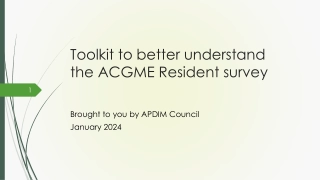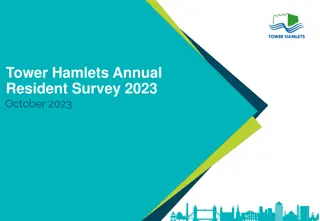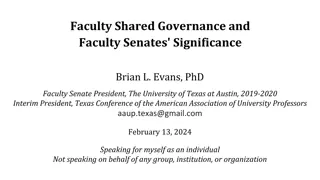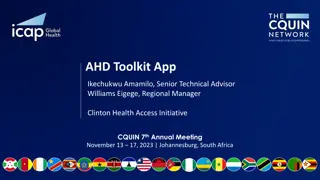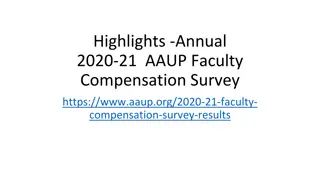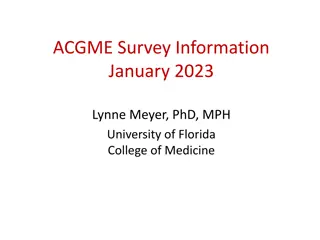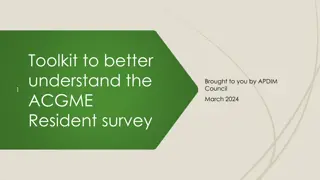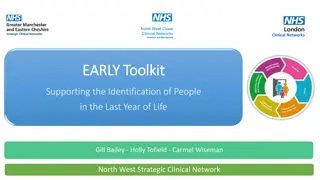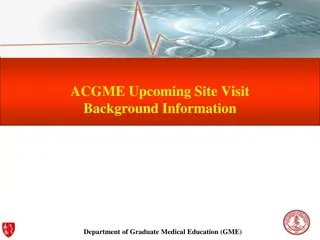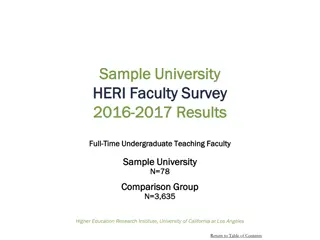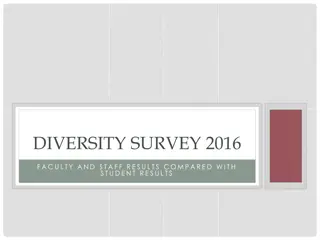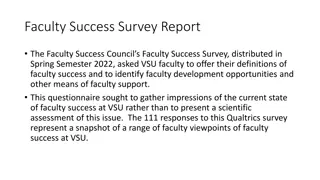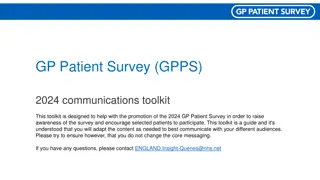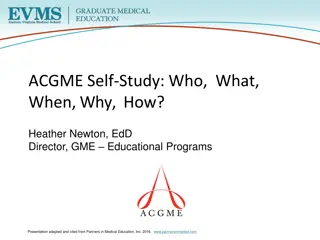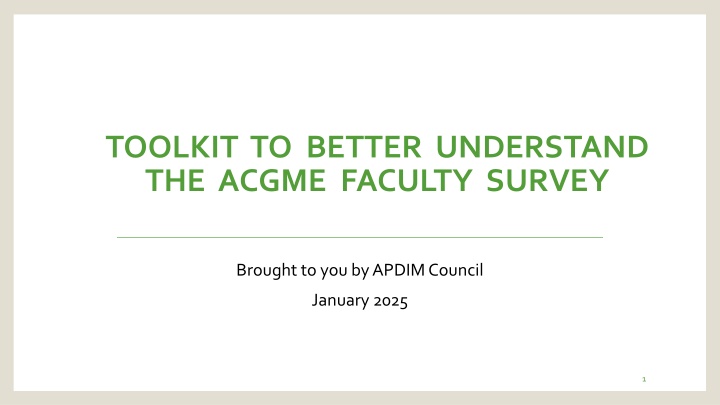
ACGME Faculty Survey Logistics and Guidelines
Learn about the purpose, importance, and logistics of the annual ACGME faculty survey conducted by the APDIM Council. Understand survey guidelines, answer honestly, and ensure accurate representation of your experiences. Be informed about the survey frequency norms and how to participate effectively in the process.
Download Presentation

Please find below an Image/Link to download the presentation.
The content on the website is provided AS IS for your information and personal use only. It may not be sold, licensed, or shared on other websites without obtaining consent from the author. If you encounter any issues during the download, it is possible that the publisher has removed the file from their server.
You are allowed to download the files provided on this website for personal or commercial use, subject to the condition that they are used lawfully. All files are the property of their respective owners.
The content on the website is provided AS IS for your information and personal use only. It may not be sold, licensed, or shared on other websites without obtaining consent from the author.
E N D
Presentation Transcript
TOOLKIT TO BETTER UNDERSTAND THE ACGME FACULTY SURVEY Brought to you by APDIM Council January 2025 1
Purpose of the survey The survey is conducted annually and contains questions about your clinical and educational experiences as well as your teaching environment The data gathered in the survey is confidential and only aggregate program level data is provided by the ACGME to administrators and program directors The ACGME uses data from the resident survey as one of several tools to help determine program accreditation and to identify any potential problem areas where a program can improve the education of its residents 2
Answer the questions honestly 99% of IM programs receive Continued Accreditation Answering the survey honestly does not jeopardize program s accreditation status 3
Survey is for your current academic year experience Unless otherwise stated, the ACGME survey is asking you about your experience over the course of the current academic year (from July 1 to June 30) This includes your experience in the inpatient, outpatient, and virtual settings, so please consider the entire year in your replies 4
Logistics of the survey Your program will let you know when the survey is scheduled this year the ACGME is scheduling all programs for an 8-week window from February 10 April 4, 2025 You will receive an email from the ACGME with instructions for taking the survey. This email may get routed to your junk mail folder so please check your junk mail if you can t find the email The ACGME encourages you to ask your program for clarification regarding questions or terminology used in the survey that you do not understand 5
Survey Frequency norms Always/A lot = very frequently Often/Quite a bit = frequently, not seldom Moderately/Sometimes = on some occasions, at times A little/Slightly = infrequently Never/Not at all = at no time, not ever ACGME may consider sometimes and moderately as potentially noncompliant The 5-point scale may flip between positive and negative responses being at the top or the bottom during the survey 6
Satisfied with professional development and education This does not necessarily mean you had to participate in the opportunity as the question is asking if you are satisfied with the opportunity provided to you for faculty professional development and education Faculty development and scholarly activities include: Teaching/Educational skills Quality improvement and patient safety Fostering your own and/or the residents /fellows well-being Practice-based learning and improvement (e.g., evaluating your own and system practice habits and incorporating the best evidence to improve patient care) Contribution to inclusive clinical learning environment Include program-specific examples 7
Data about practice habits Faculty receive information about their practice habits on a routine basis. Data can come from the hospital and/or the clinic setting Examples in the hospital setting may include hospital core measures relevant to the specialty, QI projects outcomes, hand hygiene data, or any data from the hospital about your practice patterns as a group Examples in the ambulatory setting may include your patient panel data on chronic disease metrics and preventive health measures (e.g. vaccinations, age-related cancer screening) relevant to your specialty continuity clinic 8
Professionalism What mechanisms do you have to confidentially report unprofessional behavior? What mechanisms do you have to deal confidentially with problems and concerns? Include program-specific mechanisms Have you experienced or witnessed abuse? Abuse defined as public humiliation, physical harm, threat of harm, sexual or other forms of harassment, coercion, denial of opportunities or lower grades/evals or offensive remarks due to gender, race/ethnicity, sexual orientation Abuse against student, resident/fellow, faculty, and/or staff 9
Patient Safety and Teamwork Do you know how to report patient safety events? Include program-specific screenshot(s) on how to report patient safety event Do residents/fellows participate in adverse event or root cause analysis? This can include actual events or simulation , in-person or virtual, individual or group Include program-specific examples What mechanisms are in place so that patient information is not lost during hand-offs or transitions of care or shift changes? Include program-specific examples 10
Transitioning care when fatigued The question is asking whether there are mechanisms in place that allow residents/fellows to transition care when they are fatigued This can include a jeopardy or back-up system to take over call, a coverage system among in-house residents to allow the fatigued resident to go off duty, a coverage system where the fellow or attending takes over call, a way to stop new admits or duties and transition to another care team member Include program-specific examples 11
Working in an interprofessional team Interprofessional teams include any members of the following: fellows, nurses, case managers, pharmacists, social workers, and other allied health personnel The teams do not have to be embedded into your rounding time, and can be external to rounding time in the inpatient setting In clinic or ambulatory settings, this includes all work with nurses, medical assistants, pharmacists, case managers, and social workers; even if this does not occur during the patient visit Include program-specific examples on education and role modeling of interprofessional teamwork 12
Evaluation and Feedback as an Educator This question is asking if you are satisfied with the process by which you receive evaluation and feedback as an educator. Feedback and evaluation can be written and formal (as in a written evaluation) and/or verbal and just-in-time The ACGME may ask you about both 13
Educational Content on Healthcare Disparities and Cost-Effective Care Education to residents/fellows may include any methods e.g. online modules, written materials, workshops, didactics In the course of day-to-day patient care including virtual visits Community-based experiences Include program-specific examples: 14
Cost Awareness This may include High Value Cost-Conscious Care Opportunities to discuss cost awareness with faculty in patient care decisions? Education may include any method e.g. online modules, written materials, workshops, didactics In the course of day-to-day patient care including virtual visits Community-based experiences Interprofessional patient-care discussions e.g. Pharmacy, Social work Include program-specific examples (conferences, case-based discussions, QI curriculum/projects, etc.) 15
Diversity and Inclusion Program engages you as faculty to recruit and/or retain diverse residents/fellows Program fosters inclusive work environment Inclusive is with respect to race, ethnicity, gender, sexual orientation, ability, or religion How does program foster diverse resident/fellow recruitment and retention? Include program-specific examples of resident/fellow diversity efforts 16
Protected Time for Core Faculty & APDs The ACGME Faculty Survey will NOT include questions related to FTE for Core Faculty & APD. This slide is informational for residency program leadership Please know that Effective July 2022, ACGME requires at a minimum, the required core faculty members, in aggregate and excluding program leadership, must be provided with support equal to an average dedicated minimum of 0.1 FTE for educational and administrative responsibilities that do not involve direct patient care. (ACGME CPR II.B.4.d) Discuss with your sponsoring institution leadership on how you wish to communicate this information. Be sure to provide program-specific examples to communicate to your APDs and Core Faculty how they are receiving FTE protected time e.g., individual-specific protected time or blocks of protected time for a group of core faculty. 17

